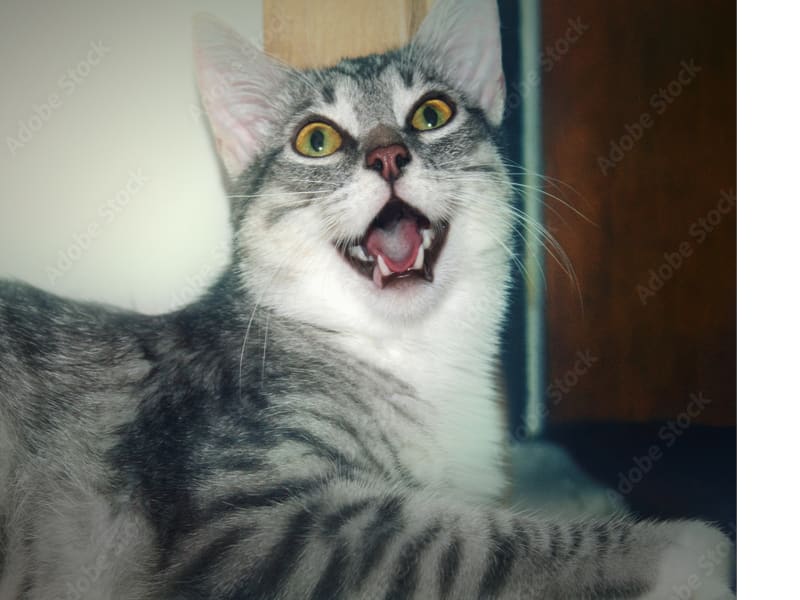While dogs frequently pant to cool down, this is a much less common behavior in cats. It can be a sign of a more serious health problem. Our Ventura veterinarians explain why your cat is breathing heavily with an open mouth, as well as when you should seek emergency care for your pet.
Heavy Breathing in Cats
If your cat is experiencing heavy breathing, it could indicate a serious health problem that requires prompt veterinary care.
If you notice that your cat is panting or exhibiting labored breathing, start by assessing the situation based on the criteria below. If you are at all concerned with your cat breathing heavily or they are displaying any other symptoms, it's best to err on the side of caution and bring them in for emergency veterinary care right away.
Normal Panting in Cats
In some cases, panting is normal cat behavior. Consider what your cat was doing or experiencing immediately before you noticed the panting.
Cats, like dogs, may pant when they are overheated, anxious, or after strenuous exercise. Panting for these reasons should go away once the cat has had a chance to calm down, cool down, or rest.
However, it's worth noting that this type of panting is much more common in cats than in dogs. So, if you're not sure why your cat is panting, pay a visit to your veterinarian.
Causes of Cat Heavy Breathing:
Asthma
- Panting, wheezing, coughing, and an increase in respiratory rate are some of the most common symptoms of asthma in cats. While asthma cannot be cured in cats, it can be effectively managed with corticosteroids or bronchodilators.
Heartworm
- In cats, a heartworm can cause breathing problems. Supportive care with corticosteroids to reduce inflammation, as well as oxygen therapy in more serious cases, are used to treat heartworm. Because heartworm disease can be fatal, it is critical to keep your cat on heartworm preventative medication every month.
Hydrothorax & Congestive Heart Failure
- Hydrothorax is a condition characterized by the buildup of fluid in and around the lungs. It can cause rapid, deep breathing, coughing, and panting. Treatment may include draining the fluid and medications to dilate blood vessels, remove excess fluid, and force the heart to contract more forcefully.
Respiratory Infections
- If your cat has a respiratory infection, it may be difficult for them to breathe normally. In cats, respiratory infections can cause labored breathing or panting. These infections usually start as viral, but they frequently progress to secondary bacterial infections. Antibiotics may be needed to treat your cat's condition and allow them to breathe more easily. As your cat recovers, humidifiers and steam can help loosen mucus and make nasal breathing easier.
Other Conditions
- Anemia, neurologic disorders, trauma, abdominal enlargement, and pain can also cause cats to pant or exhibit heavy breathing.
If you are concerned about your cat's heavy breathing, contact our Ventura vets right away for emergency care.
Looking for a veterinary specialist in Ventura?
We're always accepting new patients, so contact our veterinary hospital today to book your pet's first appointment.Related Articles View All
Anesthesia for Dogs
Most dogs are given anesthesia when they are spayed or neutered, and the majority of them will require it at least once throughout their lives. Our four-legged pets, like us, may require anesthesia as part of a surgery or procedure. Today, our Ventura vets discuss what you should know about anesthesia for dogs.
MRI for Dogs: How They Can Help
At Veterinary Medical and Surgical Group (VMSG) in Ventura, our board-certified veterinary neurologists use our in-house MRI to help diagnose a range of health issues in dogs from a ruptured cranial cruciate ligament to brain tumors. Today our vets explain why MRI scans for dogs can be helpful, and the conditions this technology can help diagnose.
FHO Surgery in Cats
FHO surgery can be an effective and relatively inexpensive surgical treatment option for hip problems in cats. Today, our Ventura vets describe the hip anatomy of cats, hip problems that could affect your kitty and what’s involved in FHO surgery and recovery.
Cataract Surgery in Dogs
Cataracts prevent light from reaching the retina of your dog, resulting in blurred vision and, ultimately, blindness. In today's blog, our Ventura veterinarians discuss the causes and symptoms of canine cataracts, as well as the surgery used to treat this eye condition.
Signs Your Pet Should See an Emergency Vet
Conditions that necessitate immediate medical attention in pets can arise in the same way that they do in humans. Ventura veterinarians explain when emergency care is necessary and what to do in those situations.

